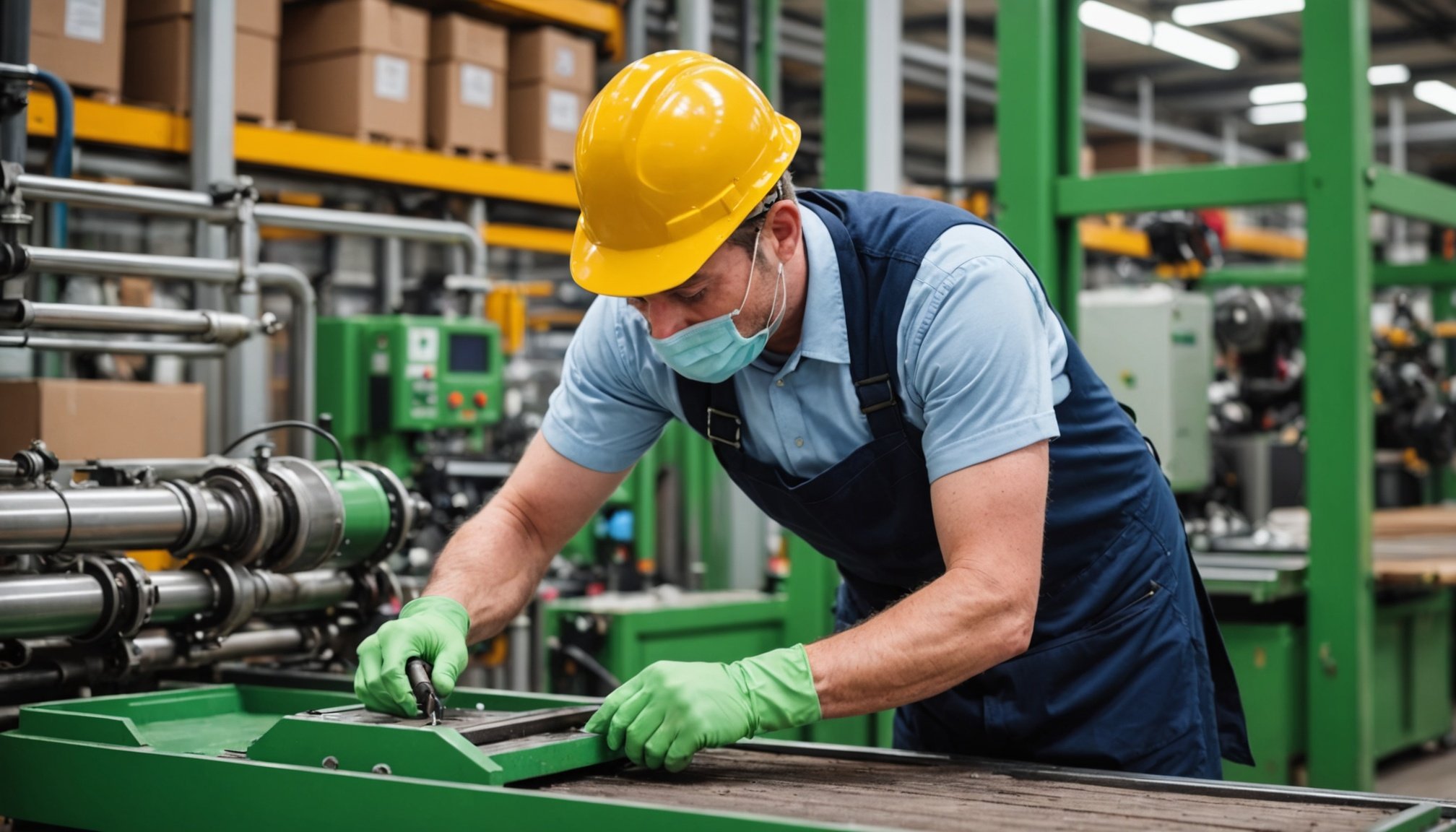Key Approaches to Eco-Friendly Manufacturing
Adopting eco-friendly manufacturing strategies is crucial for sustainable development. By integrating sustainable production methods, companies can minimize their environmental footprint and enhance efficiency. An important aspect of this is implementing lean manufacturing principles, which focus on waste reduction. Lean manufacturing reduces waste by optimizing resources and streamlining production processes, ensuring that only essential activities are prioritised. These strategies not only contribute to environmental preservation but also lead to cost savings and improved productivity.
Another key element is utilizing renewable energy sources in manufacturing processes. By incorporating technologies such as solar, wind, and hydroelectric power, factories can decrease their reliance on fossil fuels, thereby lowering greenhouse gas emissions. This transition to renewable energy is instrumental in mitigating climate change impacts and ensuring a sustainable future.
Also to read : Embracing the future: key tactics for uk manufacturers to thrive in the era of industry 4.0
The importance of these practices can’t be overstated. Eco-friendly manufacturing plays a vital role in conserving natural resources, protecting ecosystems, and supporting long-term economic growth. Businesses that adopt such strategies not only demonstrate corporate responsibility but also cater to the rising consumer demand for environmentally conscious products. Ultimately, these practices help build a sustainable industrial landscape, paving the way for future innovations in green technology.
Best Practices for UK Producers
Focusing on sustainable practices in manufacturing is crucial for UK producers aiming to reduce environmental impact. One fundamental step is utilizing sustainable materials, which can significantly lower carbon emissions and resource use. By opting for recycled or biodegradable materials, producers can contribute to a more eco-friendly production process.
Also read : Elevate your uk marketing agency: key tactics to succeed in a shifting consumer landscape
Implementing effective recycling and waste management systems is another best practice that can benefit manufacturers. Such systems can reduce landfill waste and promote the reuse of resources. By separating and sorting waste, materials can be efficiently recycled, leading to cost savings and a greener reputation.
Continuously improving through employee training and engagement is also vital. Employees should be educated on eco-friendly production strategies and the importance of sustainability. Engaging staff in green campaigns and initiatives can foster a culture that values sustainability, leading to innovative solutions and practices. Training programs can help ensure that every member of the workforce is skilled in implementing and maintaining sustainable practices daily.
By adopting these strategies, UK producers can lead in sustainability and eco-friendly production, setting an example in the industry and positioning themselves as environmentally responsible companies.
Successful Case Studies of UK Manufacturers
Examining the industry-leading examples of sustainable manufacturing in the UK, we can learn from those who have successfully embraced eco-friendly practices. Three notable case studies showcase the diverse and impactful efforts of UK companies in creating a greener future.
Case Study 1: Pioneer Manufacturer
A pioneer manufacturer stands out by integrating innovative materials and processes into its operations. By shifting to renewable resources and reducing waste, they have achieved significant cost savings while enhancing their brand image. The measurable outcomes include improved energy efficiency, leading to a reduction in carbon emissions by over 30%. This demonstrates a clear commitment to sustainable practices, offering a valuable example for others in the industry.
Case Study 2: Innovative Packaging Company
This company revolutionised its approach by developing biodegradable and recyclable packaging solutions. By sourcing sustainable materials and cutting down on plastic use, they’ve not only garnered positive consumer attention but also decreased production costs. The benefits of their eco-friendly practices are evident in increased customer loyalty and expanded market share, illustrating the effectiveness of thoughtful innovation.
Case Study 3: Renewable Energy Leader
Leading the way in renewable energy adoption, this firm has transitioned to solar and wind power to meet its operational needs. Such a shift has resulted in a 40% reduction in energy costs, proving the financial viability of sustainable initiatives. The firm’s success highlights the substantial business benefits of investing in renewable energy, encouraging others to follow suit.
Benefits of Eco-Friendly Manufacturing
Eco-friendly manufacturing offers numerous advantages, beginning with cost savings. By implementing sustainable practices, businesses can achieve improved energy efficiency, which leads to significant reductions in operational expenses. For instance, using renewable energy sources diminishes reliance on pricey fossil fuels, allowing companies to save money over time. Additionally, reducing waste through recycling and reusing materials minimizes disposal costs and promotes efficient resource use.
Another crucial benefit is the enhancement of a brand’s reputation, which can foster customer loyalty. Consumers are increasingly drawn to companies that demonstrate a commitment to environmental responsibility. By adopting eco-friendly practices, businesses signal their dedication to sustainability, thereby appealing to environmentally-conscious customers and differentiating themselves in a competitive marketplace.
Moreover, aligning with sustainable manufacturing principles ensures compliance with stringent environmental regulations. This not only helps avoid potential penalties but can also unlock access to government incentives aimed at encouraging eco-friendly initiatives, such as grants or tax breaks.
In essence, the movement towards eco-friendly manufacturing is not just a trend; it’s a strategic decision. By prioritizing sustainability, businesses can realise long-term financial benefits while contributing positively to both their community and the planet.
Challenges in Implementing Sustainable Practices
In the pursuit of sustainability, barriers to eco-friendly manufacturing present significant challenges for UK producers. A major hurdle is the common obstacle of initial investment costs. Many businesses perceive these costs as prohibitively high, which can discourage the shift towards sustainable methods, despite long-term benefits. Financial resources are necessary to adopt new technologies or machinery designed to reduce environmental impact, often seen as a formidable up-front expense.
Furthermore, navigating industry regulations and certifications adds another layer of complexity. Compliance with stringent eco-certifications requires thorough understanding and adherence to specific criteria, which can be time-consuming and resource-intensive. This procedural burden can deter producers, especially small and medium-sized enterprises, from fully embracing sustainable practices due to the perception of complicated and costly bureaucratic procedures.
Additionally, there is a knowledge gap regarding eco-friendly manufacturing. To overcome this, education and robust support systems are essential, offering guidance on sustainable methods and clear pathways to meet regulatory standards. Overcoming these challenges not only requires financial support but also a collective shift in mindset, fostering an environment where sustainability is seen as an opportunity rather than an obstacle.
Innovations Supporting Sustainable Manufacturing
Sustainable manufacturing innovations are forging the path to a greener future by drastically reducing environmental impact. Emerging technologies such as automation and AI are at the forefront, enabling businesses to cut waste and increase efficiency. These systems optimise energy consumption and streamline operations, directly contributing to eco-friendly production.
For instance, AI systems in manufacturing facilitate precise control over production lines, which reduces resource usage. This is particularly beneficial in industries like textiles and electronics, where material waste can be significant. Advanced automation technology ensures that machines operate only when necessary, decreasing unnecessary energy consumption.
Future trends indicate a growing reliance on renewable energy sources like solar and wind power within manufacturing plants. This shift not only furthers the move toward sustainability but also reduces the dependency on non-renewable resources. Additionally, advancements in recycling technology are paving the way for closed-loop production processes, turning waste into valuable raw materials for new products.
Echoing these trends, companies will likely continue to explore partnerships and collaborations to develop technologies that enhance sustainability. As these innovations evolve, they offer practical solutions for sustainable manufacturing, ensuring industries meet environmental goals without compromising productivity.
Regulatory Landscape and Certifications
Understanding the manufacturing regulations in the UK is crucial for businesses aiming to align with sustainable practices. The UK government enforces a set of rules and guidelines designed to foster environmentally conscious production. These include the Climate Change Act, which sets a legally binding target for reducing greenhouse gas emissions, and the Resource and Waste Strategy, which encourages efficient resource usage and waste reduction.
Eco-friendly certifications play a significant role in this framework by setting industry standards for sustainability. Certifications such as the Carbon Trust Standard, Green Dragon Environmental Standard, and ISO 14001 are key to demonstrating a company’s commitment to eco-friendly practices. They serve not just as benchmarks of environmental performance but also help build consumer trust.
Achieving and maintaining these certifications requires a clear understanding of their criteria. Businesses must regularly assess their operations, implement improvements, and remain compliant with ongoing audits. It’s important to engage with consultancy services or in-house teams to ensure these standards are met consistently. Staying up-to-date with the UK’s manufacturing regulations and pursuing these certifications can significantly enhance a company’s sustainable credentials. This not only benefits the environment but can also lead to increased market competitiveness.











